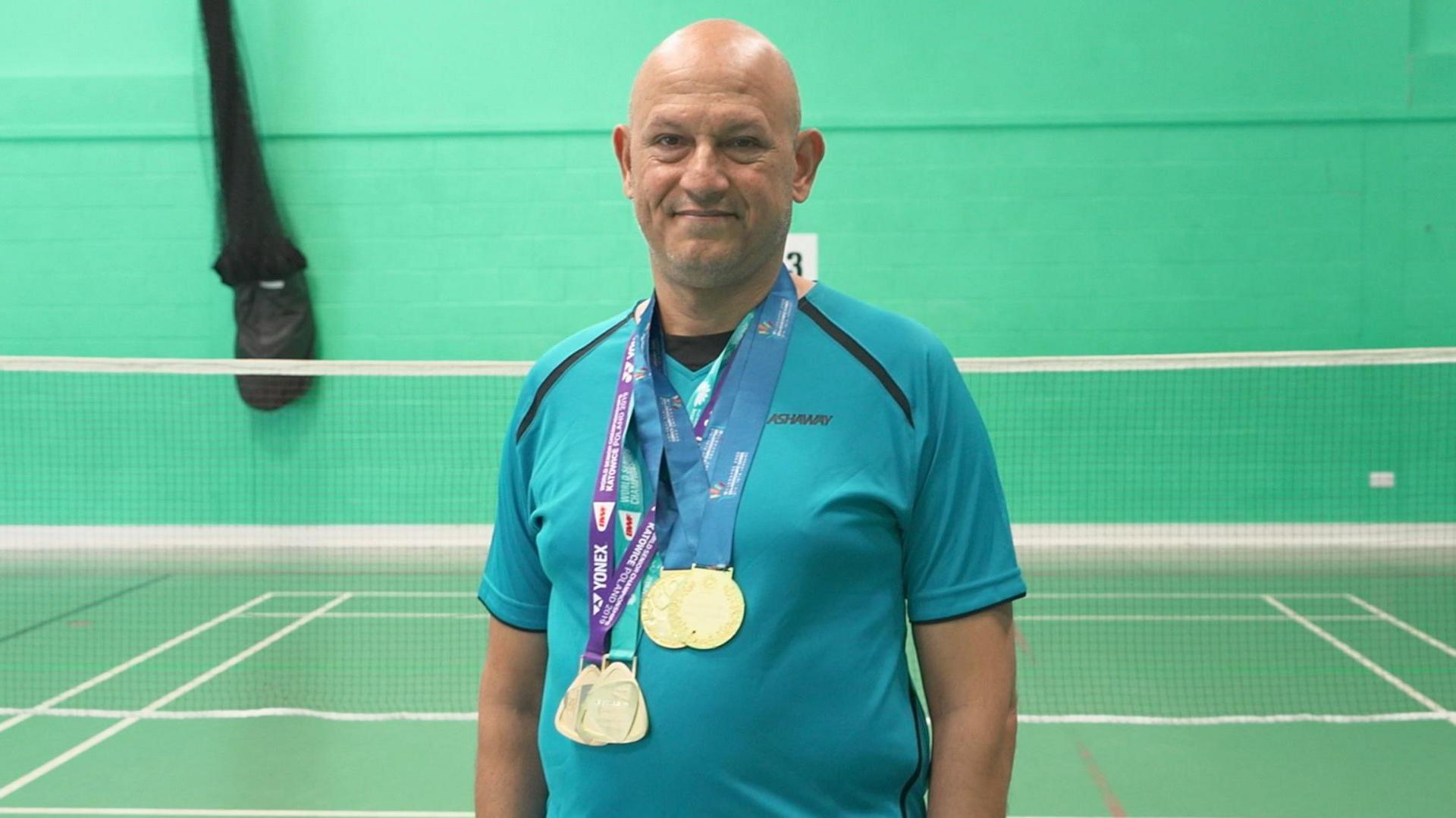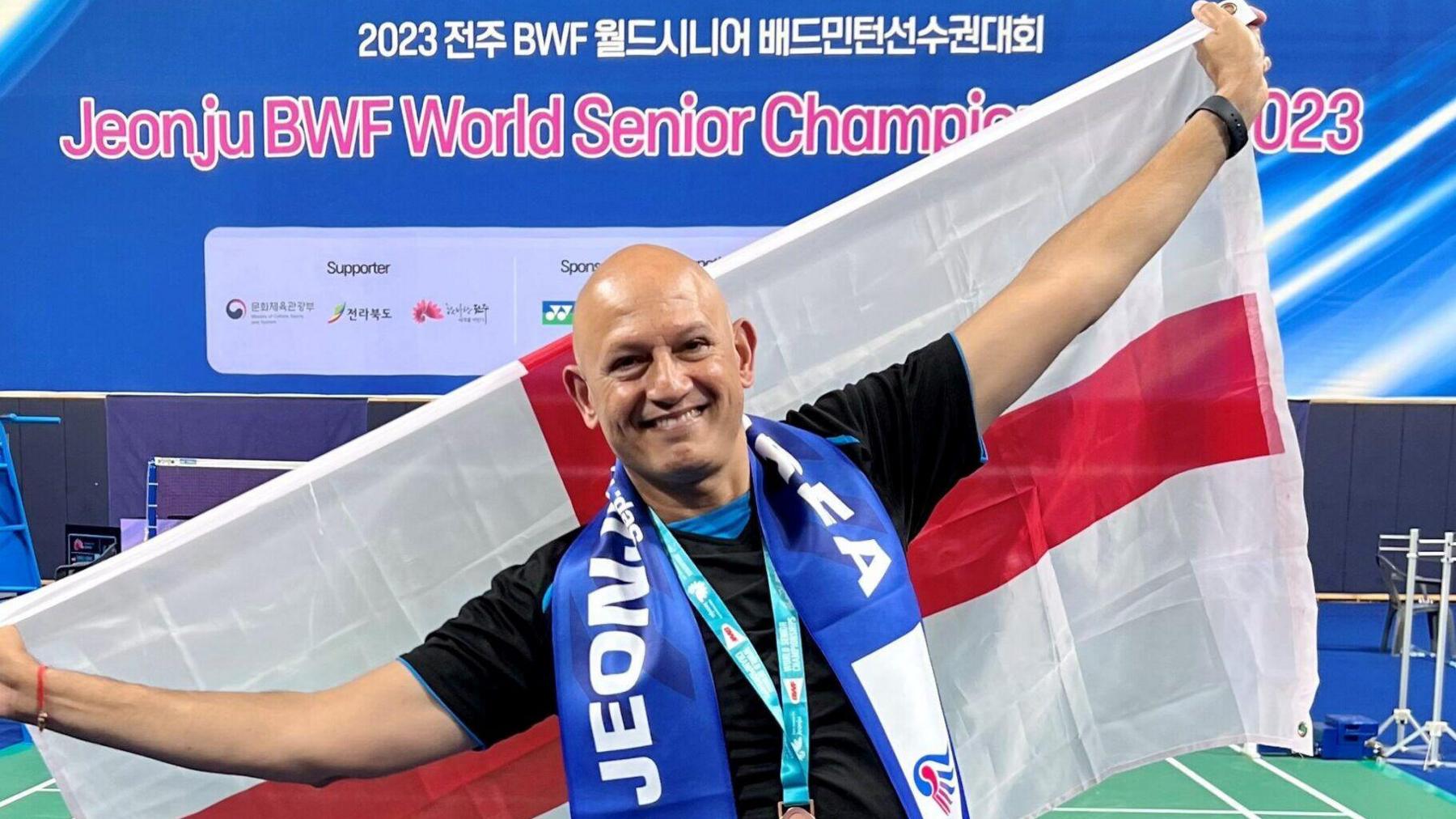'The Deaflympics was like opening my eyes for the first time'

Rajeev Bagga was named Deaflympian of the Century by the International Committee of Deaf Sports in 2001
- Published
Rajeev Bagga might be one of the greatest athletes you are not aware of.
The badminton player has won an incredible 14 gold medals at the Deaflympics - the second oldest international multi-sporting event in the world after the Olympics - earning him the nickname ‘the Wrist of Fury’.
The first Deaflympics, then known as the International Silent Games, were held in the summer of 1924 in Paris, and the Games have been held every four years since but for the cancellation of the 1943 and 1947 events because of World War Two.
To mark 100 years since the first Deaflympics and the start of Deaf Awareness Week, Laura Jones from the Sporting Witness podcast spoke to the champion to reflect on his achievements.
This is his story...
Bagga never expected to become one of the finest champions in his sport.
Born in 1967 in Mumbai, India, he lost his hearing after a severe bout of meningitis when he was just a year old.
"My parents were worried for me as I was the only deaf person in the family," he says.
"Back then, there was no communication, only constant barriers. There were no interpreters, no subtitles.
"It was incredibly difficult. My parents helped me with everything. I was incredibly fortunate."
Throughout childhood, Bagga developed a love for a wide range of sports.
"Using gesture as a form of communication, a whole world of sport opened up to me," he explains.
"Tennis, table tennis, swimming - the choice was endless. I was skilled at running and was motivated by being active."
It wasn't until he was 16 that Bagga chose to focus his efforts on one sport - badminton.
"The reason for this is simple - the game is visual," he explains. "You have full view of the court, you can see your opponent and there are no players behind you causing you to be looking around constantly."
Bagga didn't just enjoy badminton, he excelled at it.
In 1989 he competed at his first Deaflympic Games in New Zealand and won two gold medals.
"What an experience! Communication was effortless as we shared language, collectively signing together," Bagga remembers.
To compete at the Deaf Games, athletes are required to have a hearing loss of at least 55 decibels in the better ear.
There are no Paralympic categories for athletes who have only hearing impairment.
Bagga likens the Deaflympics to a newborn baby looking into a deaf world with the opportunity to access multiple international languages at once.
"It was like opening my eyes for the first time.
"The Deaflympics are designed for people like me - deaf sign language users."
Bagga adds that his identity is "ingrained in deaf culture" and the Games create "meaningful bonds through a shared language".
"Hearing badminton events aren’t the same," he explains. "The lack of language creates isolation. I play, but the lack of communication changes the experience."
Bagga's success was not exclusively in deaf competition. In 1991 he competed in his first national championship in India and won.
The following year, he won the Indian national men’s singles title and became well known for one badminton skill in particular.
"There was a phrase used in the paper, which was my favourite: 'Wrist of fury.' What praise! The newspapers said I had the best wrist, which was a great compliment. I cut out the clipping and kept it."
Bagga went on to collect a further 12 gold medals and four silvers at his next four Deaflympics, his final time representing India being the Australia Games in 2005.
He was named Deaflympian of the Century by the International Committee of Deaf Sports in 2001.
"The best Deaflympics was the fifth I attended in 2005. After winning two gold medals, I was given 'The Champion's Award', which was an exceptional achievement. I was overjoyed to receive such an accolade, it's something I'll cherish forever," says Bagga.
Bagga now lives in the UK and though retired from international competition, he still plays the sport he loves so much.
"Badminton is my life, it's in my blood - I couldn't live without it. It's something I've committed my life to and will carry on doing for the rest of my days. It's my passion. Without badminton, I don't know where I'd be."

Rajeev Bagga now lives in Coventry and still plays and coaches badminton
The next Deaflympics take place in Tokyo, Japan, from 15-26 November 2025. Deaf Awareness week runs from 6-12 May.